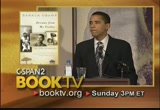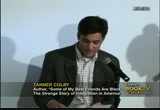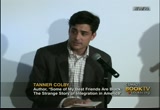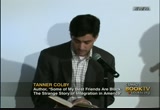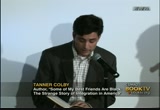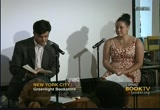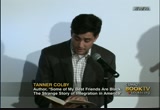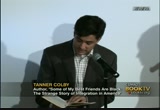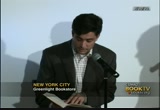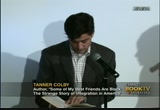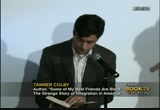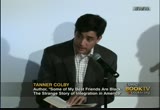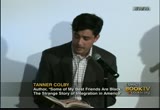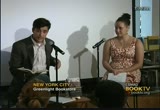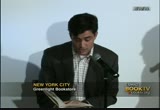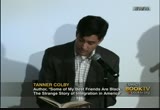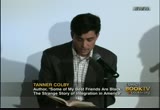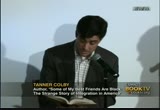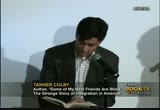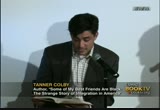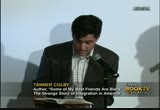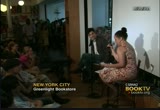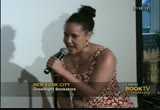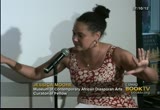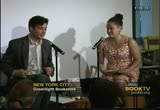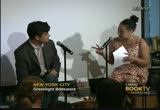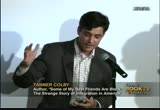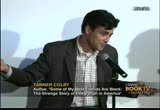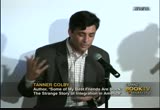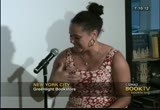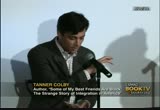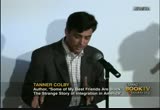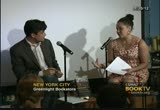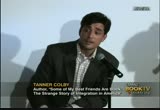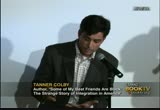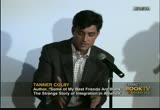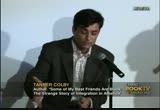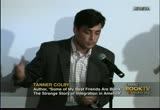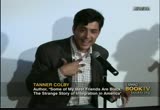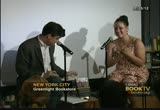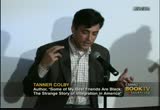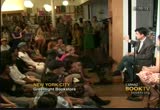tv Book TV CSPAN September 1, 2012 8:00am-9:00am EDT
8:00 am
8:01 am
>> so i write about the fact that in the book i grew up with an image of a strong black man who just didn't happen to be in the house. >> the book is "dreams from my father." booktv this weekend on c-span2. tanner colby presents his thoughts on the social, economic and political factors which have obstructed integration in america. mr. colby is in conversation with jessica moore, cure tore y'all fellow at the american museum of diasporan arts. this is just under an hour. [applause] >> we thank everyone for coming, thank you for coming tonight. as she explained, --
8:02 am
[inaudible] for barack obama, and i started asking my friends in new york how many black people do you know, and two was the highest answer i got. so i thought that by going back and backtracking my my own life, neighborhoods i live in and figuring out why these things were really white 40 yearses after the civil rights movement, that might provide answers as to where we took a left turn after martin luther king died when we tried to integrate. the first -- i was going to read from the real estate section, from the end of the real estate section where with i profiled an integrated neighborhood different but similar to fort or green in kansas city to read about all the uncomfortable black and white people living together in 2008 because i thought that might resonate. but there was too much back story to fill in, to explain how they got there.
8:03 am
i figured i'd start from the beginning which was where i went to high school. a small suburb of birmingham, alabama x it is sort of the most defiantly white suburb of birmingham. we had the confederate flag as our official school flag. i have a confederate flag on my high school diploma which my wife will not let me put on the wall for many reasons. [laughter] so that was the first place i went when i started researching the book. and we had school busing that was mild effectiveness, you could say. and the first thing i did when i went back was to get on the bus because the busing program is still in place there. and i went to the principal, and i said would you let me ride the bus out to oxmore and back, and they said, sure. go ahead. and i met this rather incredible woman named alicia thomas who not only drove the bus, but was one of the first student toss
8:04 am
ride it back in the 1970s. and she was very generous and sweet and took me along for this ride, and this is the story from that ride which is entitled letter from a birmingham suburb. it's way too early. the sun is barely out, it's cold out, and alicia thomas is warming up the engine of her big yellow school bus. she cranks the heat for her two boys. still bundled up, they're pulling out their schoolbooks. up in the front row i reach over and hand miss alicia the warm cup of coffee i'd promised when she invited me along for the ride. she says thank you with a sweet, sunny alabama smile. we idle a few minutes, then she puts the bus in gear, and we're off. alicia thomas drives the bus.
8:05 am
not the regular bus and not the short bus. she drives the other bus, the bus that brings the black kids. every weekday morning for nearly four decades her bus, or a bus quite like it, has followed the same route out there the suburbs of birmingham up columbian that road and out into the ox omore valley below. there in oxmore the bus picks up its quota and hauls it back to the lille hi-white enclave where i went to high school. the early 1970s, long before she drove the bus, she rode it as a student. it used to get so cold, she says with a shiver, remembering her mornings at the stop. the boys had to light campfires until the bus came. you had campfires, i say, at your bus stop? oh, yeah, she says. we were so country. [laughter] less than 10 miles from the million dollar cul-de-sacs, the oxmore where alicia grew up was
8:06 am
back roads at the outskirt of nowhere. there were a few ranch-style brick houses, but shacks were more the norm or some with dirt floors, others with no running water. there wasn't much to see in the valley, it was a scrap yard, a garbage dump for the industrial waste of the to u.s. steel corporation which at one time held a monopoly on the birmingham steel trade. back then the kids had to be up at 5 a.m. to walk upwards of a mile just to reach the bus stop. in her day, the bus was a rickety scrap metal clunker. their bus driver? some old white guy clutching the wheel half scared to death of the children crammed in behind him. i can just remember riding down those big hills, the brakes going out and the bus packed with kids. it was three to a seat with the rest on the floor and no
8:07 am
air-conditioning. and here's this one white guy driving all those black kids. what was his name, i asked? the question brings her up short. you know, she says, i don't think he ever spoke to us once to tell us his name. we just called him shaky because he was always so nervous. [laughter] shaky, slow down, you going kill us. bass taye ya hills sits just south of blimpinging ham. birmingham. together with mountain havebrood hoover, it's named because you go over red mountain to get there from downtown. having lived there, i suppose i can say the whites aren't any more orless racist than other suburbs. but when the school was born here, the city did go to great lengths to put its feelings on display.
8:08 am
bastavia's mascot was the con fed rate rebel -- confederate rebel. his hat cocked back and a clenched fist sticking out. the official school banner was the confederate battle flag. flown from pickup trucks and waving high this the bleachers, the stars and bars was always on proud display. if you stumbled on to a football game by accident, you might think you were at a klan rally with a concession stand. [laughter] it's true. that's the image we wanted, and it stuck. to this day, racial incidents land the school on the 5:00 news. there are many in birmingham who still refuse to set foot in, quote, that racist suburb because to them this isn't just a suburb. as a symbol, bastavia hills was nothing more than a parting shot at the civil rights movement. alicia thomas first arrived here in 1971 as a kind kerr gartner. friends of hers had come before,
8:09 am
so what she encountered wasn't a surprise. huddled around the campfire, the stench of the smoke would sing into your -- sink into your clothes. for the first several months u alicia says, she and the black students were all put with a black teacher and had their classes in the corner of the cafeteria. even after she was put into regular classes, white teachers didn't treat her fairly. they assumed she was slow, less capable. my third grade teacher was a mean lady, alicia recalls. i had to say to her, i can read and write. one day she told me to get out of my class. i ignored her ask and just sat there and read my book. the coaches told her she couldn't join because the bus kids had to leave at 3:30, so we didn't even try out. i didn't know they couldn't tell us not to try out for something, and my parents had a car. they could have terrific us back after school, but the coaches
8:10 am
told us no. and so when alicia's time. still kind of separate, not exactly equal. yet she looks back on it without regret, even when remembering the worst. i don't feel like i got as much as the other kids, she says. but we didn't have anybody fighting for us. the little stuff i went through, it's nothing. i'm okay with it. i didn't have anything growing up. i know how much it did for me, and i hope i can do the same for my boys. her sons, the two young men diligently doing their schoolwork, are the reason alicia thomas is driving the bus today. after graduating, she went to the university of alabama at birmingham on scholarship, got married and settled in midfield. she landed an office department at the galleria, then ten years ago saks downsized, and she was let go. while she ponder ored what to do next, an unlikely job offer
8:11 am
floated in from her past. bastavia hills needed a new bus driver can. her children were about to start school, and she wanted them to get into a good one. she couldn't afford to live in bastavia itself, but every employee of the school system from the principal to the lunch lady can enroll his or her children for free. i knew bastavia was the best, she says, so i decided to drive the bus. it's the end of the first be leg of our bus ride, and we've reached oxmore. that's where we'd wait at the campfire, she says. oxmore is no longer the place it once was. in just the past few days, this one-time industrial scrap yard has been consumed by suburban sprawl. the old shacks and shanties are still there, but they're surrounded by a sea of mcmansions, golf courses and condominiums. on one of the frontiers between old and new, these three-story
8:12 am
monstrosities tower across shacks right across the street. alicia pulls over to let her boy withs off. they have to switch to the middle school bus. then we pick up the high school kids, they climb in one by one. we head back to the high school, newly renovated and doubled in size since i was here, and the kids all pile out to a steady refrain of, thanks, miss alicia, and study hard now, baby, and then it's back to the bus yard. her tale book ends the strangely american phenomenon known as busing. after being one of the paris to ride the bus, she may be one of the last the to drive it. the 40-year saga of court-ordered integration is coming to an end. the district court of northern alabama vacated the egg regaition system -- segregation system meaning no longer dual,
8:13 am
no longer separate. as a slave-holding nation dedicated to the principle all men are created equal, america built its house on two fundamental unreconcilable ideas. the particular chapter of the struggle that pertains to bastavia hills began in 1954 with the landmark case of brown v. board of education. brown's sweeping -- the solution we came up with was this: the school bus. in the same decade that america put a human being on the moon, our nation's finest minds could offer no better fix for 400 years of slavery and segregation, just some nervous old white guy and a jalopy going could be the mountain with everybody screaming for him to slow the hell down. [laughter]
8:14 am
so the next section is more about new york, and it pertains to the advertising industry. i worked in advertising for nine years, and it's one of the probably biggest reasons i don't know any black people. [laughter] nine agencies in -- sorry, five agencies in nine years, and i can count the number of black people i worked with on one hand. and so the piece i'm going to read requires a little bit of setup, and it's less about the employment side of the issue and more about the cultural and artistic side of advertising. what happened was i'm sure we're all familiar with mad men, is that when, you know, there was some token integration through the '50z and early '60s, and then the early 1960s and early '70s affirmative action forced
8:15 am
black people into the industry overnight. and that was the time of rising black power and black solidarity, and if you can imagine dozens of black militants shoved into sterling cooper, you can imagine how well that went over. [laughter] so what happened was blacks who worked in advertising hated it. they were disrespected, they hit a glass ceiling, their talents were marginalized, so they said, screw this, we're out of here. because they were all strong, you know, young, talented young men and women, and they said we could do this on our own. so this was a piece of the black solidarity if you're not going to help us, we'll do it ourselves. and at the time minority business set asides came along that make black-owned businesses more viable in the 1970s. and they were put in place by richard nixon which was why george jefferson was a republican. [laughter] so black-owned -- it's true. george jefferson was republican. so blacks left mainstream
8:16 am
advertising agencies and set up their own agencies across the street which had a very interesting impact on the nature and culture of advertising itself. for most of america's history, if blacks were present in advertising, they were there as the help because that was the vision that america had of itself, you had aunt ya my ma and the cream of wheat guy, and that was as far as blacks were considered in the role of advertising. and all through the '50s and '60s, the pressure on madison avenue was, hey, you need to show racially-neutral advertising of black and white people getting along so which shows the nation we can be. but in the era of black power, that kind of reversed itself and said, no, we need black advertising, but we need positive black advertising. and so the black agencies sort of asserted that as their turf. we own that. and this is sort of the consequences of what became of that and what happened to the industry because of it.
8:17 am
and the two people you need to know, two incredible men that i was fortunate enough to interview because they both have some magic secret of longevity. they're in their mid 80s and they're still really brilliant guy cans, roy eaton was the first black man on madison avenue to write advertising for white people. he was kind to have jackie robinson of the industry. and he worked there for a long time, and he didn't like the black agencies. he thought that was bad for black people the form their own businesses. on the other hand, you had byron lewis who formed a business after the white agencies wouldn't let him in, and he owned the longest-running, one of the most successful and lucrative black ad agencies in america. so byron lewis and roy eaton figure in here. in the 1960s, civil rights groups had demanded thatly-neutral -- racially-neutral advertising be
8:18 am
created. they insisted on consumer messaging that spoke to blacks as blacks in a visual and verbal language that only black agencies could understand and translate to the market. targeting for the black consumer is an anthropological consideration more than a marketing consideration, asserted thomas burrell of chicago's burrell communications. vince colors developed a whole school of principles he called soul marketing, complete with fully articulated instructions of how to use the term boss and jive. in washington black leaders took affirmative action mandates and used them to secure broadcast licenses for radio and television. black agencies asserted their right to control the ad dollars that flowed to those outlets. the pages of ebony and jet came alive with black is beautiful. slogans pitched sham p poos to a fast-growing population of urban consumers. these were positive imma'ams 245 -- images that black america
8:19 am
had never seen of itself in the media. now it could be aspirational too. there was so little awareness of blacks as people, byron said. we had no other national media that would give the african-american consumer a feeling of what we could accomplish in society. i felt that anything that we did that would ultimately project a positive image of blacks would be a good thing. that little commercial we were able to do, given what else was out there, helped give a lot of people hope that they could do things. undertaken with this noble intent, black advertising would still prove a difficult niche to work. not every product we why has a cull before we buy has a cultural component for it. a car battery, does it start my car? that's all people want to know. but if byron lewis wanted to get the ac dell coe account, the first question he faced from a
8:20 am
client was, what's black about it? everything had to be racialized on some level to justify winning the business. otherwise why not simply go to a general market agency? so black agencies were left trafficking in stereotypes of their own. studies showed that blacked smoked menthol cigarettes just enough that tobacco companies saw a market to exploit. colors took newport and made itsy anonymous with black power. a black man with a righteous afro proudly introducing bold, cold newport, a whole new bag of menthol smoking. radio ads were broadcast live from power rallies calling on young black men to light up a menthol it was a hit. the marlboro man of black pride and a textbook example of the power of aspirational
8:21 am
advertising. show people the world they want to live in, and let the product take it to them. soon, kools and merits were on the bandwagon as well, and today 75% of black people smoke menthols as opposed to 25% of white people. same as we know that white people drive volkswagens and drive chardonnay while wearing dockers at our james taylor concerts. [laughter] it's just another way for us to project our preconceptions onto each other. that type of bias always existed, but instead of fighting it, the back agencies embraced it. after years of telling mainstream agencies they had to market to black america, black agencies were now saying mainstream agencies couldn't market to black america, only black agencies were qualified to do that. and the black agencies only further cemented the institutional bias that had kept them out of the industry in the first place. if only black people can sell to
8:22 am
black people, then surely only white people can sell to white people, and white people were the lion's share of the market. what's the phrase? the black agencies bought into that separation out of survival, but i resisted it. i could see its iniquity. marginalizing themselves the moment they stepped out the door. if black agencies wanted black accounts, with few exceptions, that's what they'd get. despite its drawbacks, however, the advertising niche became viable, and many blacks in major agencies quickly defected. the black agencies offered a comfortable atmosphere and a chance to do important work for the community, an easy sell over the suffocating waspiness of madison avenue. when the eeoc checked inning in the 1980s, the percentage had fallen to a new low of 3.7% --
8:23 am
1.7%. madison avenue just forgot be about black people. the old boys were free to go right back to selling marm run -- margarine, snorting cocaine and banging their secretaries. the basic power structure was not impacted as all. in the majors of enemy and black enterprise, black agencies were a force to be reckoned with and a serious contender for big budget accounts. yes they weren't. they did begin to amass annual billings in the hundreds of millions, but madison avenue runs in the hundreds of billions. black enterprise published itself annual list of the top-owned black advertising agencies. all 20 combines accounted for 0.5% of the industry's total revenues. all the power stayed in the corporate boardrooms of the fortune 500. if black power didn't exert power there, it had no power at all. the idea of a buy-black economy
8:24 am
was a fantasy. nowhere is this more obvious. a whole new bag of menthol smoking. the profits of which all went to the back in company which would -- tobacco company which would later be named as the beneficiary of assets accommodated through the labors of enslaved african-americans. the idea that only blacks could advertise to blacks and by extension whites to whites chugged along smoothly until december of 1983. with thriller on its way to becoming the best-selling album of all time, michael jackson landed a $505 million en-- $5 million endorsement deal from pepsi. and it would hold that record until two years later. pretty soon bill cosby had the number one tv show in the country, and eddie murphy was one of the biggest box office draws in the world. it became painfully clear what
8:25 am
roy eaton had known all along, culture doesn't have a color line. art may be rooted in serb ethnic traditions -- certain ethnic traditions, but an idea doesn't respect boundaries. you can't take a business of ideas and mandate where black stuff and white stuff is supposed to go. the division had nothing to do with talent or even profitability, it was just based on racial assumptions. the only reason blacks couldn't sell to whites was because they were rarely given the chance. but after michael jackson -- [laughter] it's true. but after michael jackson, madison avenue started to reconsider its assumptions. shorting white talent and black talent on opposite sides of the street officially became a terrible idea in 1992. mc hammer was hired to be the spokesman for kentucky fried
8:26 am
chicken n. a now-infamous commercial, mc hammer rolls into a small town kny, and -- kfc, and no one behind the hammer can believe he's mc hammer. so he does his flashy hammer dance, and they give him some fried chicken. [laughter] every black person looked up at the tv set and said, really? black man dancing for chicken? [laughter] america was becoming an increasing ri multicultural marketplace, but madison avenue couldn't communicate with it own customers. there was no going back. no meter how the -- black kids -- [inaudible] ever true to its nature, corporate america followed the money. general market agencies started big footing black agencies muscling in on their turf and kept making horrible mistakes in the process. madison avenue needed black people, only when agencies
8:27 am
looked around to find them, they weren't there. most aspiring black professionals were following their peers into other fields. they never thought to consider a career in the advertising because there weren't any black people in advertising to tell them about the wonderful opportunities for black people in the advertising. most of the major agencies kept up half-hearted minority recruitment policies, but nothing was done to mentor or groom those people. very few stuck around and broke through. few enough that they're real easy the find. as far as black creative directors out there who are doing really interesting work, one of them said to me, in my personal opinion, there are seven of us, and that's being generous. maybe eight? it's a problem. [applause]
8:28 am
>> hi. i just got a note. i would like to say that i would like to acknowledge state senator montgomery. is she here? hello, state senator. how are you? [applause] so just to keep it brief, again, my name is ca moore, i'm the ceer tore y'all fellow at the contemporary museum of african-american diasporan arts for 2012-2013, we are considering this book signing for mr. colby, or do you prefer tanner? >> tanner's fine. >> the fall/winter exhibition that opens october 18th and ends january 20th, so the book signing is going to include three different books. the first will be, um, our kind of people written by -- [inaudible] the second will be occupy, amity
8:29 am
pay wrote the article. she's part of the 99% about the black experience in occupy. that'll happen in august. then in september we're having pat thompson here to do the book signing for "listen up, whitey." so we have a lot of interesting books all related to this conversation we're having. so the questions i'm going to ask you are going to actually follow the trajectory that you just covered with your readings. >> okay. >> we're going to start with multiculturalism in the '90s and education, and we're going to end with hot topics that are happening in advertising and -- [inaudible] having to do with postblackness, gentrification and the idea of assimilation and what that really means and is it another word that easy anonymous with integration. that easy anonymous with integration. i went to high school in macon, georgia, and that's a lie because it was 30 minutes south. so the culture you're talking about, i understand very well as
8:30 am
far as polar used -- polarized football games. friday night is the night all the black kids go out, saturday night is when all the white kids go out, and that was in the early 2000s that it was still that way. you were born in 975, correct? >> correct. >> so 1975 happened, that's about ten years after we had brown v. board of education, correct? >> uh-huh. >> and, um, desegregation took effect around the early '70s, around the time you were born or really started heating up around that time. >> right. it basically was stonewalled until '68 and '69, and the supreme court basically told white people, get on with it already. >> right, get to it. so by a time you were a teen, it was the '90s and that was an era of multiculturism, in living color, dancers from all over the place. so what did integration look like for you personally as a
8:31 am
teen, did you ever notice it? >> oh, we didn't have it in bastavia hills just to give you an idea. we had one black student in our multicultural awareness club. [laughter] i'm not kidding. so the multiculture, you know, era was a little bit more when i got to college. you know, my -- bastavia -- it was still very much like, oh, there's the cosby show, and then there's housing projects downtown. until i started digging into this, you know, i always thought that the black kids on the bus came from downtown, because when i was 12 years old o i thought down town was where black people come from. [laughter] what did i know? the idea that today came from this rural, you know, this rural, poor town was completely new to me in.
8:32 am
>> so there's a jump. you begin on your web site at the beginning of your book, you start with the election of barack obama. you voted, and then you had the realization, wait, there's no one intimately, professionally integrated into my life fabric that i would consider african-american and/or black. so what was the process like of doing your research in coming to coppsness about this kind of binary quote that we call our american life? >> it was a very slow process. it -- i can tell you exactly what happened which is that the first phone call i made to my friend standing right back there who was the, one of the only black students at our high school, and when i called her and said i'm thinking about doing this book, she's like, all right, you're crazy, but go for it. [laughter] and she's been incredibly helpful and open, and when you're a white person and you delve into this kind of thing,
8:33 am
you spend like your first year and a half in this state of moral outrage because you're like, oh, my god, horrible things that have, that this country has done. >> white guilt. >> white guilt, yeah. moral outreal, and that's when van met me, one of the guys i profiled in the advertising chapter. he laughs at meeting me now in the middle of my white guilt phase. but then slowly you realize how crouseless this -- useless this moral or outrage is. you put that away and go, okay, this is evil, but it's fascinating. so just, you know, understand it so that we can figure out how to take it apart and move past it. and so i think the reason white people stay away from really engaging with this topic is white guilt. i don't want to go there, and what white people don't realize
8:34 am
once you get passage to the other side, it's awesome because you're totally comfortable talking about it, and you don't have to be one of those white people who's like racism's bad, you know? [laughter] i was at an advertising party, and we were talking to this white girl, and i said something, it was just candid. it was just like, you know, a candid assessment. and this white girl's like, oh, my god, you can't say that in front of kwame. and kwame's like, no, yeah, you can say whatever you want. and she's like, really? [laughter] and kwame's like, yeah, it's cool. you can say anything. and she's like, oh. well, i guess i don't have anything to say. [laughter] and the great thing about delving into this topic as deeply as i did is you can move past that and engage with, you know, black people and anyone really on a more intimate and
8:35 am
intellectual level. it's not, it's not about, you know, we tend the talk about learning about race as white people need to eat their vegetables, and it's something we have to do as an after school assignment because white people were bad which is the wrong way to go about it. when the real reason to do it is this is fascinating and interesting, and it just makes you a better, more interesting person, and, you know, gives you a wider range of movement in society because we are becoming a more diverse, multicultural society. >> so being both from the south it's very different the way we use terminology to refer to people. i first moved here in february, so i noticed when people said white people and black people, they said it like that whereas "24" if south, you know, white people and black people -- it's very, you know, people who aren't from the south, they hear it the way people intone on those words, they go -- >> right. >> they're like, why did you say
8:36 am
it like that? so as you talk about becoming comfortable with the information and you talk about being able to more intimately involve yourself with people who are considered part of the african-american community, i want to know how you came to the editorial decision to use the terms blacks and whites. because sometimes white writers who are writing about people of the african diaspora are can i say blacks? or is it african-american? royeaton is of west after-- >> if i had used african-american every time i used the word black, i would have added 5,000 words to the book, and i was already running out of room. [laughter] the other main consideration was really not so much a political one as i was writing all the way from the era of, you know,
8:37 am
colored water fountains and, you know, negro rail cars through black power, through multiculturalism, and it's like, okay, where do we use one, where do we use the other? and because the fulcrum to have book comes in this era of, you know, i sort of preface with a lit l of the desegregation, but it's more about white flight and black power. when integration came, it was black power and white flight. and i thought, you know, those are two very, you know, clear terms of this period that we're talking about. we got to the '90s, and we started talking about african-american, caucasian-american and put a sort of more euphemistic tone on it because that made it more digestible, i guess. unless i was making specific reference to, you know, a colored water fountain or quoting someone in modern times who preferred to use the term african-american, i just said, you know what? i'm just going to make it easy
8:38 am
on myself, and everything's going to be black or white. >> okay. >> so that was the reason for that. >> another word about term terminology. you use the word integration and desegregation interchangeably at times in the book. sometimes the way people interpret desegregation or the way they use the word is to reference the fact that perhaps integration never really happened, so desegregation started separating. everybody was separated but kind of categorizing everybody -- and then bringing them together again with integration. >> right. >> so was it intentional that you used the words interchangeably, or was this a difference between the two words? >> i used them interchangeably, it was inadd very tend. i tried to be more specific about how i was using them. so that wasn't really a conscious decision. but, you know, desegregation to me more has to do with the legal aspect of it, of taking the laws down and saying you can't have
8:39 am
white water fountains and colored water fountains, and integration was the period where white people took their water fountain and built a golf course around it so they wouldn't have to share it. [laughter] >> so referring to the water fountains, here's a quote from the chapter what can brown do for you. ful it says i found that federally-mandate canned integration of the most segregated city in america did not come to an end because white people were trying to keep black people out. it ended because black people weren't willing to move in. the as well you write about the difficulty of maintaining autonomous black schools, nakeds, businesses and churches so between those two conversations in the book is the question, how did white communities -- i know you write extensively about in this -- >> right. >> how did they manage the develop successful, autonomous communities and black
8:40 am
communities still struggled to do so? what did your research show in answer to that? >> white people have all the money. >> end point. >> yeah. [laughter] yeah, yeah. i was talking to someone, you know, a lot of them -- some of them, you know, oh, affirmative action for white people, you know, basically white people basically appropriating things. oh, white people have affirmative action, why don't we too? white people have money and power and a huge voting majority that they can sway however they want, and that's very different from affirmative action which says you can have this muchmr. chairman. so, you know, the fact that the white people were, you know, they moved to the suburbs, they had absolute voting majorities for themselves. they voted you can only have a house worth this much for this size and, thank you, no, we won't have public transit to come this way, and that cordoned itself off in a de facto way
8:41 am
that blacks weren't able to do because that's one of the things i talk about in the black, in the real estate chapter is that when integration was supposed to happen in a real estate sense, it largely department because it was the era of -- didn't because it was the era of the urban political machine. we need to stick tailgate, we -- together, we need a bloc vote. and it was a very reasonable reaction to have at the time. unfortunately, again, white people had all the money. and so is -- fabulous issues of ebony magazine where bayard rustin and harold cruz and andrew bremer who was the first black governor on the board of reserve all write eloquently about how separatism's going to fail. it's a wonderful, romantic
8:42 am
theory that, you know, we can have a strong black society, and we should have a strong black cultural base that we use as a forward-leaning, you know, base of operations to move into white society. and places like fort green were that in the 1990s. you look who came out of here, spike lee and the artistic movement, it was very forward leaning into white america. it wasn't a retreat and control our own turf sort of black community. but far too many, this is ours and y'all take the suburbs, and we'll just play like that, and it didn't work because, um, largely because of financial resources. >> right. in the preview of the book signing that was released today written by rachel -- is rachel out there? hi, how are you? nice to -- thank you. appreciate it. there's a comment that's in there, and there's also another -- and it's also in the book, of course, that really
8:43 am
highlights the idea that integration did not happen in this a consistent way because perhaps black people or the black community did not want it to happen. they did not want integration. and my first question towards that is, was that your intention for that to actually be highlighted as kind of like a thesis for your book, and the second question is, do you think that perhaps the idea of integration -- which is largely framed as black communities picking up and integrating into white communities -- is a coded term for assimilation? >> okay. i take the first part of it, what was the first part? [laughter] remind me again? >> um -- [laughter] i think -- >> oh, yeah. >> thank you. >> what came out of of the book is that it was perfectly understandable. if you think about how black people were treated when they first integrated into white
8:44 am
colleges, of course your immediate reaction is going to be thanks, but no thanks. we took care of ourselves for 100 years, we'll do it again. that was a perfectly understandable emotional reaction to have, and in many ways integrating or assimilating in the 1980s was, as stokely carmichael and those people say, it was a form of cultural general side because assimilation was so horrible, and you could not be yourself, have dread locks or express yourself in any way, have any blackness about you and be in the white person's world which has changed somewhat these days. so my point was not to sort of blame black people, but to say it was a perfectly understandable, you know, emotional and can psychological reaction to the way they were treated during integration, but the reality was it sort of went down a socioeconomic cul-de-sac which sort of goes to your second question of is integration a code word for assimilation?
8:45 am
there's yes and no. there's really sort of two forms of integration or two reasons to integrate in america. one as posited by martin luther king in the '60s was largely a moral case that, you know, we so damaged this country, we're so alienated from each other, we -- there's so much friction and hatred that the people in charge can exploit to play us off one another which has been the whole story since day one, and the only way we can repair that an notty and ail -- animosity and alienation is to know each other on a personal level. we all have an equal responsibility to educate ourselves and to try and know one another and respect one another and learn more about each other. the other sort of working definition of integration has more to do with gaining access to opportunity and power, being a disenfranchised group and moving toward the center of
8:46 am
power o that you can control how that power's exercised, and you have access to those opportunities for your children and is so forth. -- and so forth. and in that sense, we have all the money. so we're here, and in that sense of integration white people already integrated. we integrated because our grand parents did it for us. it was a lot easier for them because they were polish or italian or whatever they were, and assimilation was far, far easier process for them. but we're already integrated into the power structure. so that's -- we're going the hang out here and stay, and in that second definition of integration, to us in is more on -- onus is more on outside groups to choose whether or not they want to assimilate. nobody has to. to choose how close you want to bring yourself into that white community and to us in on white people -- can the to us in on white people is to not be with
8:47 am
morons. one, yes, a form of assimilation, the other has more to do with what we call diversity and multiculturalism. >> in the section of your book where you're talking about church and religion, you made a -- there was a whole history that played out where black catholics really did not want to leave their church. and you describe the kind of architectural luxury in the white church and then the difference between -- >> right. >> -- what was accessible architecturally, structurally. um, it took a long time, it seemed to me when i read, for the two masses, for the two congregations to come together because there had been this church that had a tradition, and in the end everybody ended up picking up and going -- >> to the white church. >> do you think that another reason why integration is so difficult is because the black community feel like they are losing -- >> right. >> -- losing those institutions, because they feel as if they're being -- integration means
8:48 am
picking up from what you had and moving over instead of the white community picking up and coming in with negotiations? >> right. well, white people aren't going to pick up and come this way because you can't integrate 65% into 12%. what happened in this town is the last chapter of the book. i went and looked at churches because that's the most segregated in america, and whether or not you go to a religious church, we all have something that is our church, whatever social entity you partake in. in louisiana it's unique in that in the 1800s plaque people and white people -- black people and white people, catholics, went to church together in louisiana. we were at least under the same roof. and then along came jim crow out of new orleans, and as segregation started getting a deeper root in society, you know, whites didn't want to go to church with blacks either. so the hierarchy said let's just start mitting up -- let's give black people an optional church. well, ten years later optional
8:49 am
means jim crow, so you have all these little towns all over louisiana, the towns aren't big enough for one church population wise, yet sometimes there's two. it's the same -- you go to one or the other, it's the exact same mass being said. it's the craziest thing. there was one town that i profiled in the book in 964 a black man tried to go to the white church, and they beat him and can assaulted him in church and threw him out. and that was the catalyst for the priests in that town to say, all right, you know, we're, we're responsible for this. we started this because we're the one who split these institutions in half, and the only way we can be one community is to be one church. and in many ways they started off, you know, king solomon being like, okay, we'll have one mass at the white church, one mass at the black church. it's not like they made all the
8:50 am
white people move to the black church. they dissolved the parishes and came up with a new name, new phone number, new stationary. and it was all going very well until it came time to you gotta pick one building. at the end of the day, only one building is big enough to hold everybody, and that's the white church. and the priest who was there at the time was a very, very smart guy, and he said, you know, this isn't about the building. it's about how black people perceive that they'll be treated as citizens in this new society we're attempting to form. if they feel in any way they're going to be treated like second-class citizens, their not coming -- they're not coming. so what he proposed was let's remodel the interior of the church because it's time, blacks used to have to it in side pews, and he said let's remodel the interior of theture can have, get rid of the jim crow pews, we'll lop off the back, and it'll be a symbolic gesture.
8:51 am
well, white people went ape shit. you can't take our benches. [laughter] and then that was the sign of bad faith that black people said, okay, yeah, they're not ready to treat us as equals, so we're going the stay over here. and the integration only really fully happened when the white community went out of its way in the '90s and the early 2000s to make very concrete gestures to say, you know, you're welcome here. and what's fascinating is it has a lot of parallels to hurricane katrina. a hurricane blew threw and tore off the black church, and they faced a choice, do we spend there are 10,000 putting a new roof on the black church, or do we move into one building like we always should have been? and the difference between new orleans and this town is that this town has been 40 years of people trying to come to an understanding. and then they were able to integrate the church. i don't want to give away the ending, but, um -- and now you
8:52 am
have what is a white church with a gospel choir. it's kind of, you know, it's, it's what integration should be. it's not give up everything you own and just come here and play by our rules, it's we share, and we respect each other, but at the end of the day white people have a bigger roof if we're all going to be under the same roof. >> so for my final question, um, multiple times throughout the publication you give examples of how the generation that was born in the late '80s or in the early '90s and in more recent times when you interview them, they don't seem to notice race as much or to harp on it as much when they're talking about their social groups. they categorize themselves in different way, they find different ways to integrate amongst themselves. do you think in a way that that is a representation of the progression of the idea of postblackness? are you suggesting that a postblackness or even a
8:53 am
postwhiteness is occurring in our american society? >> i would say it's getting better where it's getting better, and it's getting worse where it's getting worse. i think you have some communities where you had schools, and unfortunately it's largely a class issue. it's getting better on this side of the class divide where people, you know, don't feel as economically threatened, um, and so they're more willing to accept diversity because they don't take it as an economic threat. you know, like my old high school i went back to, it was horrible in 1970 when alicia thomas was there, it wasn't much better when we were there in 9888 -- 1988, and it really wasn't that much better in the early 2000s. the real change has come in the last five years. um, and they have a principal there now who has made a deliberate effort to change the culture of the school, and you have more black families moving in who are willing to get past the idea of that racist suburb and embrace the fact that a lot of the white people who live there are decent folks.
8:54 am
so you have much more collaborative -- and in places like that it's getting better. but then you still have the old money suburb where in 1992 i believe they had four black students out of 4,000, and today they have nine? so it hasn't really improved there. and then you have birmingham city which is now 99% black. the schools are horrible. and part of the reason that the suburbs have been diversifying is the city schools are so bad that people are just getting out. so you do, you know, that's -- and part of the reason i wrote the book the way i did was to focus on within high school, one advertising agency, one neighborhood in kansas city and one chump was, you know, t -- one church was, you know, it's not really, i'm not saying we've got cannen better, but this is what happened at this school. and i picked those four things, school, neighborhood, workplace and church, because those are all things --
8:55 am
[inaudible] it's not so much a universal, i think there are universal principles in the book, like we've been talking about integration, but as far as like what's getting better or, you know, where is it getting better, i think it's far too nebulous to say really. >> so what's next? >> for me? >> yes. >> my wife wants me to do a book about gender. basically, a guy going into the world of -- especially with all this work life balance stuff that's been blowing up in the news. i enjoy a wonderful life of living and working at home and walking thing to and cooking dinner because my wife as a wonderful job where she's able to have health insurance and stuff. [laughter] and if bros who run corporate america like, keep giving women
8:56 am
a horrible time, that messes with my situation, and that -- [laughter] that's no good. so i think, you know, younger -- and it's absolutely true because there was a study that came out a couple weeks ago that these 50 and 60-year-old guys who still run thing, they have 1950s style marriages so they don't get the idea of a co-equal marriage between partners. so i don't know, something about guys my age trying to make work life better for women for our own sake. [laughter] but again, true, we don't need to treat feminism like making men eat their vegetable z because men suck, you know? it's like we need to be a better society, and a better society would treat women and minorities better. and that makes life better for me, and i'm just a more educated person for having done so. so that's what's in the works. >> thank you so much, tanner. we're very happy to hear you speak. >> thank you. [applause]
8:57 am
i want to give a very, very special welcome and shout out to van. [applause] >> van grave. >> van grave. and -- [inaudible] >> yeah. and there are many, many other people here in the book who deserve thank as well, obviously, but it also goes to the point of assimilation. there's one last story i'll tell. in the advertising industry, the naacp is currently suing the advertising agency because it's an old boys' network,therefore, that's racial discrimination, therefore, we're going to see you and take you to court. >> actually, i laughed for 15 minutes at how you wrote that. the n ark acp was ready to sue the pants -- >> sue the crap out of -- >> yeah. >> something that only, a, a
8:58 am
lawyer could think of and, b, was one of the dumb e things i'd ever heard of in my life. if problem is they aren't in the same social networks in terms of getting access to power be, if that's the problem be, why would you build a bureaucratic legal work around? wild you -- why would you try and build a work around to the problem instead of solving the problem? the problem is we don't know each other in the personal social world, then that's what we need to fix, and everything else is just, you know, a band-aid. >> great. from the ground up? >> yeah. and so everyone here, my friend chris who sent me to kith -- kansas city. >> yea, thank you. >> tycely who i went back to my high school, and she helped me. and the church i found out about because one of the priests there in the '70s married my brother and his wife ten years ago. so everything in this boom is all who you know. -- in this
8:59 am
book was all who you know. i wouldn't be sitting here without racial integration. so that's the moral of the story. >> everybody, tanner colby. [applause] >> for more information visit the author's web site, tannercolby.com. >> here's a look at some upcoming book fairs and festivals happening around the country. ..
231 Views
IN COLLECTIONS
CSPAN2 Television Archive
Television Archive  Television Archive News Search Service
Television Archive News Search Service 
Uploaded by TV Archive on

 Live Music Archive
Live Music Archive Librivox Free Audio
Librivox Free Audio Metropolitan Museum
Metropolitan Museum Cleveland Museum of Art
Cleveland Museum of Art Internet Arcade
Internet Arcade Console Living Room
Console Living Room Books to Borrow
Books to Borrow Open Library
Open Library TV News
TV News Understanding 9/11
Understanding 9/11
